The Observer Book List
The Different Book Lists
 1. Don Quixote by Miguel de Cervantes (January - June 2015) [Book #129/305]
1. Don Quixote by Miguel de Cervantes (January - June 2015) [Book #129/305]
Also on the Norwegian, Sybervision, and My Book lists - Whenever I hear anyone reference Don Quixote, it is frequently in regards to his fighting windmills, or riding around on an old horse with a fat squire on a donkey. Well, that is pretty much the first 20-50 pages of a 1,000 page long story. Preconceptions of the story do not really encompass the true breadth and depth of it. The story is about a man who feels he has been tasked with restoring knight errantry back to Spain and dupes a simple minded farmer to accompany him (Sancho Panza). When I first started to read the story, I felt like this was the story for me. It was serialized television long before television even existed. There were even phrases like "when we last left our heroes...". It seemed perfect for me. The translation I was reading was awesome as well (the Everyman edition). It was translated into a very readable sort of Old English, with all of the poetry and songs maintaining their rhymes. I assume the context and feel of the story was maintained even though the wording needed to be changed. And my version extended the feel of the novel to the translation itself. The novel is written as if it is a Spanish translation of an older text (Arabic I believe), where my English translator even had notes added on top of his translation by an editor. It definitely gives it a story handed down through time aura about it.
The problems I have with the story started pretty early though. I felt the story started to drag on really early in the first part. Adventures seemed to take forever; there were many side stories that added little (if anything) to the overall narrative, and I just felt the pace of the story slowing down dramatically. I felt I needed to trudge through most of the middle part of the novel until hitting the second part. When I really started to enjoy the story was during the last third of the novel, when the story became self referential. The first half of the novel was apparently published earlier and characters within the second half of the story had often either read it or had heard of it. There is even parts where a real life sequel to the first book was published by a different author and the characters in the book go out of their way to prove that book to be a false sequel. It's actually pretty meta. As for the ending: it felt very, very rushed. The ending could have been placed at any point in the book and still have fit, as there was no real build up to it during the narrative. It would have been better if certain story points (mainly Dulcinea del Toboso) were even addressed during the ending instead of just dropped as if she never even mattered. Overall, I would say the story was actually quite a bit of fun when it started to pick up during the later half but an abridged version of the story may be the way to go for many people (although I personally refuse to go abridged).
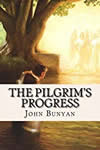 2. The Pilgrim's Progress by John Bunyan (December 2016) [Book #142/305]
2. The Pilgrim's Progress by John Bunyan (December 2016) [Book #142/305]
Also on the Sybervision list - I will start off my review of Pilgrim's Progress with my general review. This is an overly heavy-handed biblical allegory written at an elementary level. First off, almost every single character in the book is a trait that defines the character, i.e. Mr Honest, Faithful, Mr Worldly Wiseman, etc., where sometimes the traits don't even make sense based on the way the character acts. It is as if the author didn't know the definition of some of the words he used. Second, the story is written very poorly. It feels like the writer has never actually written a book before. Phrases are repeated line after line and the setup of the book doesn't make sense. It is written as if it were a play, with the characters name spelled out where they should talk, but then it has a phase like "so and so says this." for instance:
"Christian: 'Truly,' said Christian, 'I do not know.'"
Why would you call out the character that is going to speak, then write again that they are speaking? And the story is beyond hypocritical. Maybe it is because I am not a religious person, but the main character, Christian, complains about nobody listening and doing what he tells them they should do, but he doesn't do anything they tell him he should do. Do as I say not as I do? Every single character is one note, and the women characters in the second part of the story are next to useless. Why make the second part centered around Christian's wife (whom he left willingly) to just make her a useless character that needs everyone around her to do everything for her? In short this is a overly heavy-handed, misogynistic, racist, piece of garbage that I am thankful that I will never have to read again.
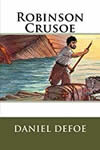 3. Robinson Crusoe by Daniel Defoe (September-October 2008) [Book #78/305]
3. Robinson Crusoe by Daniel Defoe (September-October 2008) [Book #78/305]
Also on the Sybervision list - While I was reading Robinson Crusoe, I definitely got a Cast Away feeling about the book. I know many people thought that Cast Away was a boring movie, and the book came across the same way. It just seemed to drag on forever. At the beginning of the novel I kept waiting, and waiting, for him to become ship wrecked, and then when he finally was, nothing exciting happened. For a book that seemed to be billed as an action-adventure novel, I got none of that through the narrative. It's not a totally bad book and I rather enjoyed the plot, I just felt it was really slow at times. I found it amusing how, no matter what Robinson did, he seemed to end up with the short end of the stick. One major problem I had with the book though, was that Defoe constantly referred to the Native Americans/Native Islanders as savages and cannibals. I can see how Crusoe might have thought of them that way at the beginning of the story but even after meeting them Defoe continued to show them eating other humans. Sorry, but cannibalism was not that widespread. This is a definite pass for me.
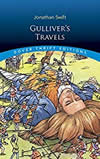 4. Gulliver's Travels by Jonathan Swift (2002) [Book #18/305]
4. Gulliver's Travels by Jonathan Swift (2002) [Book #18/305]
Also on the Norwegian and Sybervision lists - Gulliver's Travels is another of my "I had to read this in college" books that I need to go back to sometime when I have the chance. I read this book towards the end of my undergraduate career and getting nearer to when I started this book list in earnest. I had found the book very enjoyable that superficially was a fantasy book but in reality was a political commentary, very similar to how Pratchett writes his Discworld series. The main plot of the story follows Gulliver as he travels through many fantastical islands after he is the victim of a shipwreck. These islands includes races of tiny people, the Lilliputians, a race of giant people, a flying island, immortal people, and a race of talking horses, among others. Throughout it all he is forced to face the realities of his world when confronted with these fantasy situations. Gulliver's Travels is considered to be one of the greatest masterpieces in the English language and I look forward to revisiting it someday.
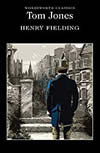 5.Tom Jones by Henry Fielding (May - July 2008) [Book #73/305]
5.Tom Jones by Henry Fielding (May - July 2008) [Book #73/305]
Also on the Sybervision and My Book lists - I found that although Tom Jones is a rather long book (my copy was over 850 pages) I greatly enjoyed reading it. The author is more of a narrator than an impartial observer. He readily makes comments throughout the book that makes you feel like you are sitting by a fire listening to him relay the story. It was definitely a different approach than most I have read and I greatly enjoyed it. The story was exquisite. It is about a bastard, Tom, who was abandoned by his mother to be raised by a very benevolent man. Although, I did not readily agree with some of the lessons at the end of the book (like how birth makes more of a difference on who the boy is, not just his character) I still enjoyed it and the ending did bring a tear to my cheek. Throughout the story the author kept making Tom's situation worse and worse and I thought that there was no way to bring him back in a believable manner, but it worked out rather well in the end. I definitely enjoyed this book and recommend it to anyone with a few months to read it.
6. Clarissa by Samuel Richardson
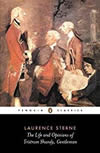 7. The Life and Opinions of Tristram Shandy by Laurence Sterne (August - October 2021) [Book #167/305]
7. The Life and Opinions of Tristram Shandy by Laurence Sterne (August - October 2021) [Book #167/305]
Also on the Norwegian list - Published over the course of eight years from 1759 to 1767, Tristram Shandy represented a departure from the typical books of its day. This book may be more seen as the proto-stream of consciousness novel with the author frequently bouncing around topics like they were in a pinball game. Sterne would go from his primary story, those about himself and his family, to some obscure, barely related tangent in the blink of an eye. He would then realize his tangent and eventually work his way back to the story in question. Although this was clearly the purpose of the book, it got to be extremely irritating. The book is written as an autobiography and stream of consciousness from the perspective of Tristram himself. However, it became abundantly clear that the story wasn't even about Tristram when it takes the author a third of the book to get to his own birth. The book winds up focusing mostly on the life of his uncle, Toby, as well as Toby's servant Trim. But despite the frequent tangents, the book actually turns out to be quite funny. There are times when one of the characters are trying to tell a story of their own and they keep getting interrupted by the other characters, so that each time the one telling the story starts to tell it, a new chapter starts. The title of that chapter then says something like "trying this one again", where eventually it takes the story teller five chapters to get the story finished. Another funny thing is how the book is constructed. Looking at the book itself, I assume most versions are published specifically how the author intended because of the way it is written. In my version of the book there were instances where entire pages were blank or page numbers skipped over on purpose. One such section threw me through a loop because 10 pages were skipped along with an entire chapter. The author then goes on to explain why those pages were skipped over, stating that he purposely ripped out the chapter. It's definitely a clever way of approaching the book and one I had never thought of. Even besides the constant bouncing around of topics, I think the thing that makes this book really difficult for me to read, is the way that it is written. Sentences will seem to go on forever with em-dashes breaking up thoughts within the sentence itself, so it's difficult to tell where a sentence truly begins and ends. This is very reminiscent of the later James Joyce in his Ulysses, a novel I also did not enjoy. Overall, this book felt like a chore to read with the constant thought diversions preventing me from being able to focus on the story myself. Along with the author, I felt my own attention wandering throughout the book. But this is clearly a work before its time. It stands out as a masterpiece of fiction for doing something that nobody else at the time was doing and in a way that made it at least somewhat enjoyable. Would I recommend this for people to read, definitely not, but as a lesson about the history of writing fiction I can definitely see this novel as a significant contributor.
8. Dangerous Liaisons by Pierre Choderlos De Laclos
 9. Emma by Jane Austen (October - November 2006) [Book #53/305]
9. Emma by Jane Austen (October - November 2006) [Book #53/305]
Also on the BBC list - Coming into Emma with a fairly large preconceived notion about the Austen/Bronte books of the time, I was pleasantly surprised and this book was actually better than I was expecting. Once I got passed Austen's round-about way of speaking the book rather intrigued me. The story is about a female in her early twenties among the upper class social scene of rural England. She had vowed to never marry in order to not stress her father. Instead of indulging in her own love-life, she then tries to hook up her friend Harriet. The problem comes when Emma realizes that she is really bad at playing match-maker and eventually causes more problems than if she had just left everything alone. The story wraps up very nicely in a happily-ever-after ending. My biggest complaint of the story is that the language used made the book very difficult to follow at times and Austen could have definitely used "by the bye" far less. Although I enjoyed it, I do not recommend it, especially compared to Austen's much better and more famous Pride and Prejudice.
 10. Frankenstein by Mary Shelley (2004) [Book #27/305]
10. Frankenstein by Mary Shelley (2004) [Book #27/305]
Also on the Sybervision list - There are many stories on this list that quickly fade from memory. Upon looking at a synopsis I can often regain what the story was about and some plot details but many are just unremarkable. Frankenstein is not one of those books. I recall this book in vivid detail, despite writing this 15 years after initially reading the book. The story is very well known by this point in our history. A doctor keeps experimenting, and eventually succeeds, in bringing someone back from the dead. Actually a lot of someones, since the monster is essentially an amalgamation of a bunch of different parts. But the story itself brings up a very unique quandary. Should humanity attempt to play God, and what happens when it occurs. It is a very short read, having read it in only two days. And the writing itself is not that great. I found the book felt "unpolished", for lack of a better word. But the concept is what keeps Frankenstein in the social conscious. Many movie adaptations lack the essential part of the book, which is that the monster is not only self aware, but a fully intelligent individual intent on discovering why he was created by his master, otherwise known as his God. The book is written as a series of journal articles, a method not commonly done back in those times, however is remarkably similar to Dracula in that way. Through this method you get inside Doctor Frankenstein's mind as he works his way through his creation. A very clever book indeed, and one that I'm sure will stick with you through time.
11. Nightmare Abbey by Thomas Love Peacock
12. The Black Sheep by Honore De Balzac
13. The Charterhouse of Parma by Stendhal
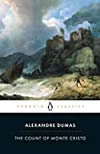 14. The Count of Monte Cristo by Alexandre Dumas (Januray - March 2023) [Book #175/305]
14. The Count of Monte Cristo by Alexandre Dumas (Januray - March 2023) [Book #175/305]
Also on the BBC and My Book lists - The Count of Monte Cristo actually ended up being one of the longer books that I have read at 1,200 pages, which doesn't seem that long compared to some books, but this was a densely typed up book for those 1,200 pages. And although it was very long, and took me three continuous months to read, I actually greatly enjoyed it. The story follows Edward Dantès, who gets accused of a crime and locked away for many years. While in solitary confinement he befriends an abbe who is also locked up and helps him to not only escape but how to unearth a vast treasure. Upon his escape he plans meticulously at retribution against those that have wronged him. And while the story could potentially get tedious, it never actually does. It remains fresh and enjoyable throughout. The beginning part of the story takes place during the exile and eventual return of Napoleon, a period of time in French history that I am not as well acquainted with, and I found this little insight from the French point of view fascinating and how these events helped shape what the story became. My favorite parts were towards the beginning, while he is in prison, but even the latter half that turns into a Jane Austin novel, are also remarkably fun and enjoyable. My biggest problem was just keeping everyone straight and who did what to who and how they all are related to Edward, or the Count of Monte Cristo, as he eventually became known. Overall, this was an excellently paced novel and very well written, and I am putting it on my personal greatest books list as a recommend.
15. Sybil by Benjamin Disraeli
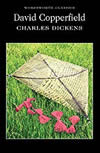 16. David Copperfield by Charles Dickens (January - March 2013) [Book #116/305]
16. David Copperfield by Charles Dickens (January - March 2013) [Book #116/305]
Also on the Sybervision, BBC, and My Book lists - This was one of the longer books I have read in a while and I did greatly enjoy it. I found myself wondering what was coming around every turn of the story. Although, after reading the "review" that was found at the end of my version I did notice some rather odd things about the story. Mainly, the first part of the book felt very, very different from the rest of the book. The first part was rather dark and things kept getting worse and worse for David. Once that portion was past though, the book seemed to level out and although there were some bad times, there was nothing quite like that first part. Another thing that has me confused is on the title itself. The story is named after the primary character, David, who for one doesn't go by "David" for the majority of the story. Also, the story focuses more on the supporting characters than on David himself. I felt I was watching the lives of the secondary characters pass through, rather than seeing the story change by any actions of David himself. The story itself was very well written and I was surprised that characters that seemed to be one-note characters would constantly reappear later in the story. Many of these characters did get tiresome, they eventually did redeem themselves by the end. The story itself is easy to follow and well written and I must say this was the best Dickens' story I have read. By the end of the story, I did feel that some of the character arc conclusions left a little to be desired. But overall, the story was well done and I would have to recommend people pick it up.
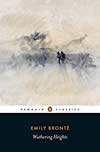 17. Wuthering Heights by Emily Bronte (May 2006) [Book #45/305]
17. Wuthering Heights by Emily Bronte (May 2006) [Book #45/305]
One of the 2 on all 4 of the 100 lists (Sybervision, Norwegian, BBC, and also My Book list) - Wuthering Heights ended up being a very weird book and not at all what I expected. I initially considered this to be one of those "chic lit" books but I couldn't have been more off. This is one of the most depressing books I have read yet. The book explores how Satan himself can sometimes corrupt people into being wretched human beings, but in the end sometimes they are able to pull through. Most of the story takes place as a flashback of one of the former housekeepers. It is a little confusing and not very enjoyable at first because of the erudite language Bronte used, but after a few chapters I got used to it. After the flashback it shows an orphaned child, Heathcliff, brought back to the house and is shunned by everyone. However, Heathcliff eventually takes over everything. Since most of this is known at the start of the story, it is interesting to see how everything comes about and to see how two separate families who differ in everything (intelligence, strength, and health) intermingle. This book is definitely on my must read list and it should be on yours.
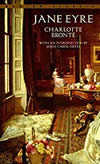 18. Jane Eyre by Charlotte Bronte (December 2003) [Book #21/305]
18. Jane Eyre by Charlotte Bronte (December 2003) [Book #21/305]
Also on the the Observer, BBC, and My Book lists - Continuing on through my grandfather's book collection I noticed there was a large number of books by Jane Austen and the Bronte sisters. And so I decided to sit down and tackle some of those books. It has been so long since I have read Jane Eyre, I feel that I can't do it justice anymore. This is another of the books I need to go back to at some point. Our title character, Jane Eyre, starts off the story at an orphanage and eventually grows up to live with the famous Mr. Rochester. I almost feel like Mr. Rochester is more of a famous character in modern day society than even Jane Eyre is herself. The book is a fun romantic novel with an air of mystery that definitely deserves another go around for me.
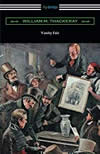 19. Vanity Fair by William Thackeray (August - October 2016) [Book #139/305]
19. Vanity Fair by William Thackeray (August - October 2016) [Book #139/305]
Also on the Sybervision and My Book lists - Vanity Fair had sat on my shelf for many years because I was not in the mood for more of the 18th century "romance novels". The kind of novels that were exemplified by the Bronte sisters and Jane Austen's works. They are all right to read once, but too much of that stuff wears me down. I feel there is no real "meat" in those books, just all fluff. Vanity Fair, though, is not one of those 18th century romances. In fact, it is the quintessential opposite in which Thackeray purposely makes fun of those novels. Thackeray's main characters are often vain, selfish, petulant, and immoral. Everything you wouldn't expect from an 18th romance novel. This actually made it a pleasant reading experience. I even laughed out loud at several instances throughout the book. The book is set up as written by someone who is acquainted with the main characters and is narrating their story as a storyteller would. This goes so far as to even have the narrator frequently making reference to the fact that you are reading a book that he is retelling. In terms of story, the main character, Becky Sharp, is not a hero. She is not even likable through much of the story. The only time that she may actually be likable is when you aren't sure if she is being sincere, which I am not convinced ever happens. Although she is the main character, the plot of the story works its way through two main families (the Crawleys and the Osbornes), taking it's leave of Becky when other story lines would take precedent. The plot and time moves steadily on throughout the story with characters coming and going as needed. My main problem with the book, though is that even though the writing is very well done, the story itself is rather dull at times. At over 700 pages long, it takes a long time to work through the narrative. The story could have been trimmed up pretty easily making the pace move a bit faster. I would often get bored of reading the book and need to put it down for a few days because there was nothing drawing me to read more. However, as I moved on towards the end I felt the urge to keep reading build up. Overall, I would say that the story was enjoyable, and funny at times, if not a little bit long winded, but I recommend it nonetheless.
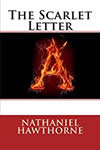 20.The Scarlet Letter by Nathaniel Hawthorne (2001) [Book #17/305]
20.The Scarlet Letter by Nathaniel Hawthorne (2001) [Book #17/305]
Also on the Sybervision list - This is one of those "forced to read in college" books for me. I didn't get it at the time and that makes me want to go back and see if I better understand it now. At the time I had felt that the beginning was extremely slow and that had a tendency to drive people away from the book (at least that's how I felt). However, the book does get better fairly quickly. The novel follows a woman, Hester Prynne, who committed adultery and conceived a child from the affair within Puritan society. The strict rules of this religious society forces Hester to wear a bright red "A" to announce to everyone her improprieties. The novel explores how religion plays into her life as well as the guilt and sin associated with it. This is definitely a novel I plan on revisiting someday.
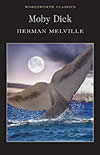 21. Moby Dick by Herman Melville (August-September 1998) [Book #9/305)
21. Moby Dick by Herman Melville (August-September 1998) [Book #9/305)
Also on the Norwegian and Sybervision lists - Moby Dick is often cited as the analogy for relentlessly pursuing your dreams, often to the detriment of everyone around you. My introduction to this book was not all that great, having been forced to read it in my senior year of high school and never fully appreciating it at the time. Besides the plot of the book, one of the things it is most known for is perhaps being one of the most famous introductory lines in all of literature: "Call me Ishmael." In general, the story is about a man while trying to take control of his fears ends up being destroyed in the process. The book reads slowly and the chapter describing whales escaped my understanding as to why it was even in the book (at least for my high school self). This is a not recommend by me but maybe this could improve with a rereading (although I don't see that ever happening).
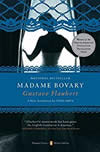 22. Madame Bovary by Gustave Flaubert (April 2010) [Book #88/305]
22. Madame Bovary by Gustave Flaubert (April 2010) [Book #88/305]
Also on the Sybervision, Zane, Norwegian, and My Book lists - The first thing I noticed while reading Madame Bovary was how well is flowed. One idea flowed into another, most of it without a break or pause. Seemingly unconnected thoughts were put together seamlessly in a string of narrative that I could only hope to replicate. I loved reading this book, especially after The Canterbury Tales, since the language was so much easier to follow and I'm not trying to decipher what the author is saying, I'm just enjoying the words. I did have some problems with the book though. The first being the very weak female characters, especially the main character. She seemed mostly to be reacting to events in her life and not being proactive in any of her choices. Nothing she did was really in response to what she wanted and more in response to what someone else wanted. And her child was the most useless of characters, almost inconsequential for 99% of the story. So, even though it did have some weak points, it was a marvelously written story and I would definitely recommend this as a must read.
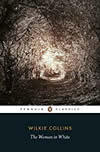 23. The Woman in White by Wilkie Collins (July-August 2007) [Book #62/305]
23. The Woman in White by Wilkie Collins (July-August 2007) [Book #62/305]
Also on the BBC and My Book lists - Of all of the books that I have read across these 100 greatest books lists, the genera that is by far one of the least represented is the mystery. Luckily we get an excellent taste of mystery in The Woman in White. The story focuses on a mysterious woman who recently escaped from an asylum. Through the story she crosses paths with the main character, Walter Hartright, and she ends up being intertwined with the plot of several different characters throughout the story despite not always being present in the story. Since this is a mystery I will not give away any of the more interesting plot points (potentially ruining it for people) but I will say that it is a love story and it all turns out well in the end. I recommended this book to anyone who wants to have a fun sit-down with a book, since it is very easy to read, flows naturally, and is enthralling from the get go. The climax seems to come a bit early, but even though the narrative slows down afterwards, it never stops. Overall it is very entertaining and a must read in my opinion.
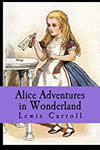 24. Alice's Adventures In Wonderland by Lewis Carroll (August 2010) [Book #94/305]
24. Alice's Adventures In Wonderland by Lewis Carroll (August 2010) [Book #94/305]
Also on the BBC and My Book lists - In one word, this book was "bizarre". This is the first time I have read Alice's Adventures in Wonderland, but I have seen both the Disney and Tim Burton versions, and both of them made more sense than this book. As my friend put it, that must have been some good opium he was on when he wrote this. The story jumps around randomly and it goes from one situation seemingly into an entirely different situation with no rhyme or reason to why. But when you think about it, it makes sense. This is a story about a dream. But it is also a story as described by a child. So you have a dream where things have a habit of just happening in the words of a child who often will jump around and make up things that don't really make any sense, all woven into this magical land where nothing makes sense and things just happen. Although I was greatly dumbstruck at first, the story began to grow on me. Nothing really happened in the story by the end but aren't most dreams like that. At one point, you just wake up. The book is very well written. It just flowed as I read it, with each sentence and each section flowing into the next. Although you knew the situations didn't fit together the narrative was never jarring between different parts. The sentences weren't choppy and it made for a rather enjoyable read to see what would happen next. So I will place this on my to read list, mostly due to the fun that reading the book could instill on a child or an adult who wonders what it is like to think like a child.
 25. Little Women by Louisa May Alcott (May - December 2011) [Book #101/305]
25. Little Women by Louisa May Alcott (May - December 2011) [Book #101/305]
Also on the Sybervision and the BBC lists - Typically when Little Women is mentioned, it is often regarded (at least in my mind) as a little girls/ chick lit novel. I had tended to stay away from this book for that very reason and it might have worked out for the better. The way I read it was very slowly, about 10 pages or so a night, to my daughter, over most of the year. In this way I had a chance to grow with the characters as they were growing and watch my daughter grow as well. I become connected to them in a way that doesn't usually happen to me and when one of them died, I really felt the loss. This book was one of the better books I have read in a while and although it would probably still be considered a chick-lit novel, I found the characters very engaging and the writing to be far superior to many books written for the same age-level. As the characters got older, the language in the book also seemed to be getting older, to the point that at the end I didn't know what several of the words even meant, or how to pronounce them. In the end, I would recommend this book, especially as a family read-time book. I had a great time reading it to my daughter and I could feel many families would enjoy a similar experience.
26. The Way We Live Now by Anthony Trollope
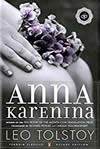 27. Anna Karenina by Leo Tolstoy (December 2008 - January 2009) [Book #80/305]
27. Anna Karenina by Leo Tolstoy (December 2008 - January 2009) [Book #80/305]
The only one on all 5 lists (Norwegian, Sybervision, BBC, and Zane) - Being the only book on all 5 of my Greatest Books lists, I had high hopes for it. And to start off, I thought this was one of the most well written stories I have ever read. Tolstoy just flows with descriptions that make you feel you understand everything that is going on. The characters are extremely well developed and even though they are Russian (which has a tendency to jump around with names a bit) it is still easy to follow who is who. I enjoyed several of the references to early communist culture (the book takes place about 30 years before the communist revolution) and several of the characters' personality polarities and themes that are emphasized in the book (religious vs non-religious, upper vs lower class, etc.). However, I did have some problems with the book. The story felt like two separate stories going on at the same time. The "main" one should be the one with Anna but I got the feeling that for the most part the main story was the one that centered around Levin, who supposedly represented Tolstoy himself. The Anna story itself felt enjoyable and well written, focusing around her leaving her husband for another man, of which that relationship slowly dissolves over the length of the book as well. While the story with Levin, although in parts were very good, I felt was very political and sometimes unimportant to anything. The whole last section (after the Anna story line was wrapped up) felt forced and out of place, leaving me wishing that the book would just end. All in all, I very much enjoyed the first half of the novel but the second half seemed to drag on a bit. I am not going to recommend this on my list and personally would not consider this the greatest book ever. But being that it is on so many book lists it probably should be one that you read.
28. Daniel Deronda by George Eliot
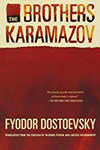 29.The Brothers Karamazov by Fyodor M Dostoyevsky (July - September 2006) [Book #52/305]
29.The Brothers Karamazov by Fyodor M Dostoyevsky (July - September 2006) [Book #52/305]
On the Norwegian and the Sybervision lists - After reading Crime and Punishment I became a big fan of Dostoyevsky, an I found that this book read a lot like Crime and Punishment, which is the reason why I liked it so much. I probably would put this on my personal must read list but Crime and Punishment is already on the list and I thought that Crime and Punishment was a much better book. Overall I though the book was extremely well written, but long (~800 pages) and I did not fully understand the point of the epilogue. A good translation can make or break a story and I have found over time that Russian literature has a tendency to translate very well into English. The Brothers Karamazov is about 3 (maybe 4) brothers all from the same father but different mothers. All of them have widely varied personalities ranging from borderline psychotic to deeply religious to the non-religious academic. The story culminates in a murder that we as the reader know the brother did not commit but he is put on trial for. I like the way the story was written, with us knowing more than the people in the trial and the ending for the most part made sense; again except for the epilogue. So if you are in the mood for a long but relatively uncomplicated read, I recommend this one.
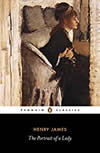 30. The Portrait of a Lady by Henry James (2005) [Book #42/305]
30. The Portrait of a Lady by Henry James (2005) [Book #42/305]
Also on the Sybervision list - The Portrait of a Lady, and Henry James in general, fall into my unmemorable category. Neither of the two stories that I have read of his on my lists I can recall at all. The Portrait of a Lady follows an American woman, Isabel Archer, who moved to Europe and ends up having to adapt from the free thinking American way of life to the more rigid thinking of England at the time. This follows the main theme of the novel, which is the mixing of the old and the new, with often disastrous consequences for the old way of life. Overall, the story is well written with an easy flow to it, however unremarkable it may be. I enjoyed reading at the time but after many years I cannot recall the plot off the top of my head at all.
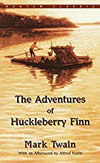 31. Adventures of Huckleberry Finn by Mark Twain (1996ish) [Book #3/305]
31. Adventures of Huckleberry Finn by Mark Twain (1996ish) [Book #3/305]
Also on the Norwegian, Zane, and the Sybervision lists - Huckleberry Finn is one of the many novels on this list which I had read as a result of a high school assignment. I actually had to read it a couple of times for school and I have since come to love the book. It is a rather contentious book because of the language used in the book, specifically the "N" word used so prolifically throughout, however I feel that is one of the reasons it should be read. The book forces people to look at where we were as a country, where we are now, and how far we still have to go. The main plot revolves around a childhood adventure story, where Huck runs away from home getting into all sorts of trouble along the way. He travels on his trip with escaped slave Jim, whom Huck goes from seeing just as a slave to eventually seeing him as a person and a friend. This book is a must read, if only because people try to ban it.
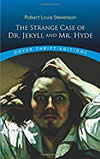 32. Dr Jekyll and Mr. Hyde by Robert Louis Stevenson (February 2016) [Book #134/305]
32. Dr Jekyll and Mr. Hyde by Robert Louis Stevenson (February 2016) [Book #134/305]
As with many stories I have read, this one was an odd one. I assume most people are familiar with the premise of the story but if not, I wouldn't read this review as I will spoil it. That being said, the premise of the story is that Dr. Jekyll and Mr. Hyde are the same person, transformed through chemical concoctions of the doctor's creation. This is what I knew going into the story. However, the story is set up as a mystery. Who is this Mr. Hyde? And what is his relation to our dear friend Dr. Jekyll? Reading the story, it felt like a second read through, where I already knew the ending and I was just reading it this time to catch up on the details I missed. A very weird feeling, considering I have never read the book before. Overall, the story was alright. It is written as an autobiographical account from a lawyer friend of Dr. Jekyll's who witnessed the whole thing. The prose is fairly straight forward, except for the last chapter, which was "written" by Dr. Jekyll and gets rather wordy for my liking. It is very short, taking me only a few hours to read, however nothing really ever grabbed my attention. I was rather interested in how the "big reveal" progressed through the story and seeing the groundwork laid down for it was fascination. But overall, I would say that if you wanted to read it, it wouldn't take very long and you may find it interesting, but I wouldn't go out of my way to find it, as it feels that pop-culture has ruined any surprises that were built into the story.
33. Three Men in a Boat by Jerome K. Jerome
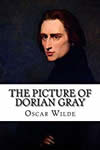 34.The Picture of Dorian Gray by Oscar Wilde (July 2009) [Book #86/305]
34.The Picture of Dorian Gray by Oscar Wilde (July 2009) [Book #86/305]
Also on the Sybervision and My Book lists - The Picture of Dorian Gray is a rather enjoyable book about a man who (unintentionally) sells his soul so that he may remain the Adonis that he is forever. Dorian Gray starts out pretty naive until he is told by a painter that he is the most beautiful person he has ever seen. After the portrait that he paints is complete, Dorian sees it and realizes that the painter is correct. At the same time he meets another man, Lord Henry, who says that it is a pity that he will lose his beauty at such a young age, prompting Dorian to sell his soul to maintain his current appearance.. Since that time Lord Henry had steadily corrupted Dorian, acting as a Satan character, leading him down a dark path. Fantastic book. The ending is perfect and unexpected. I recommend it to anyone interested in a fairly short, enjoyable read. Wilde does go off on some tangents at times and some of Lord Henry's speeches are difficult to follow, but enjoyable nonetheless.
35. The Diary of a Nobody by George Grossmith
36. Jude the Obscure by Thomas Hardy
37. The Riddle of the Sands by Erskine Childers
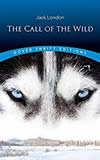 38. The Call of the Wild by Jack London (September 2005) [Book #41/305]
38. The Call of the Wild by Jack London (September 2005) [Book #41/305]
Also on the Sybervision and My Book lists - When you think about one of Jack London's Alaskan dog books, you would likely think about White Fang, I assume due to the popularity of the movie a few years ago. However, before White Fang was published, London published the much shorter The Call of the Wild. To start off I must say that this book was fantastic and I highly recommend it to anyone, especially dog lovers. It is gripping and intense, so much so that it makes you want to read more. And to top it all off, its short, only about 80 pages. I was able to read it in about 2 days without trying very hard. It is about a dog, Buck, who was kidnapped from California and taken to Alaska to be a sled dog. The book is entirely through the dogs perspective but it does not have any of the cheesy "dog voices". Not once do you hear what they are saying but you get how he is feeling, especially among his interactions with other dogs and humans. Again I highly recommend, you won't be disappointed.
39. Nostromo by Joseph Conrad
Also on the Norwegian list -
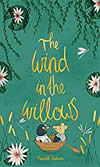 40.The Wind in the Willows by Kenneth Grahame (October - November 2010) [Book #96/305]
40.The Wind in the Willows by Kenneth Grahame (October - November 2010) [Book #96/305]
Also on the BBC list - This is not what I was expecting when I started it. At first I was expecting a kiddy story about a bunch of animals. Well, there was a bunch of animals, but it definitely was not kiddy. The story was very well written, not shying away from the larger, more adult, words when appropriate. The story at times seemed to be about random misadventures of a group of animals, but through the story you can grasp a common thread going through four of them. My main problem with the story is that I felt unfulfilled afterwards. A character like Mole really grew from the beginning of the story, where he was rather naive, to the end, where he was able to stand up for himself and help lead a revolt. Although, a counterpoint to that is the character of Toad, who did not grow at all and actually seemed to devolve through the progress of the story. All through the story I was waiting for him to get his just desserts in the end, however it never came. Even his supposed humbling at the end seemed fake; like he didn't actually feel any remorse over what he had done. So in regards to the Toad story arc, I can't really recommend this book because it was a real disappointment when all was said and done.
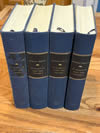 41. In Search of Lost Time (AKA Remembrance of Things Past) by Marcel Proust (June 2023-August 2024) [Book #180/305]
41. In Search of Lost Time (AKA Remembrance of Things Past) by Marcel Proust (June 2023-August 2024) [Book #180/305]
Also on the Zane and Norwegian lists - In Search of Lost Time holds a couple of places in my heart. First and foremost, it is by far the longest book I have ever read. It is ranked as one of the longest books ever written and clocks in over 4,000 pages depending on the print and page size. However a better estimate is the word count which is 1.175 million words. For comparison War and Peace has only 0.56 million words. So this book is essentially two War and Peace length books. It also took me over a year to read because it is a brain strain. He writes in VERY long sentences. Counting out the words of one notable sentence had me at 203 words for that sentence alone.
The book itself is broken down into seven volumes (these seven were then places into the four physical volumes that I had read and pictured above). The first volume of the story is probably the most famous and is often read as a standalone story, Swann's Way, however it was never meant as its own story. The text is also formatted without many paragraphs, about one per every two pages, and conversations flowed within the paragraphs instead of being seperated out into unique line breaks, as is the standard format. This means it generally took me about an hour to read 20 dense pages and I was often mentally exhausted after that from trying to follow the story. Another note of accomplishment is that this book was the last of the Zane's Top 10 books for me to finish, marking the first list I have successfully completed.
The story itself was ... interesting. It follows the remembrance of Proust's own life through his memories. And while the story generally flows in chronological order, he had a tendency to have tangential thoughts for pages at a time, where he will jump forward in time or ponder some theoretical question he had been grappling with. While I enjoyed the linear part of the story, the theoretical parts got to be a bit old after a while, especially when he would re-harp on the same essential questions over and over again. This story was also surprisingly "modern", with the author extensively tackling the subject of homosexuality. For a novel written in the early 1900's I was not expecting this pervasive look at homosexuality of the time. Here is though, one of the primary problems I had with the central part of the story. This is when the main character, presumably Proust himself, essentially kept his girlfriend "kidnapped" (for lack of a better word) in his house because he had assumed she was sleeping around with other women and he was jealous (maybe?). He would ponder many times over if she liked women, for 100's of pages at a time, with him never satisfactorily answering his own question (however as the reader I felt it was satisfactorily proven a yes). Many of the men also in the book led secretive homosexual lives, with one engaging in full on sadomasochistic acts during the latter parts of the novel. When he first delves into this aspect of the book he seemed to be weighing the morality of it, however eventually it seemed to me that he had accepted that side of society and proceeded right along (except when related to his girlfriend). Like I said, while this was completely unexpected, it was definitely not unappreciated on my part.
While there were parts of the story that were repeated ad nauseum, there were many parts I found fascinating. As time went by, we had the evolution of technology and how it changed. From the first telephones through the widespread use of the automobile, and how they impacted the characters lives. But time in this book was tricky, where it wasn't until the end of the book that I understood that this was all written as his memories. Time fluctuated through the book sporadically, to the point that you never really knew how much time had passed at any given point. Parties he attended took 100's of pages to depict but then years would fly by in the blink of a page. The book was also very "real", where deaths just happened as in real life, with most happening without a satisfactory reason that one would often find in stories. And for a book that seemingly went on forever there were many aspects that never got explained. There was a contemporary court case, often known as the Dreyfus Affair, that was constantly brought up and influenced the characters majorly, but was never actually explained within the story itself. Proust mentioned many times about his infirmity, but barely delved into what exactly he had. And there were other things that Proust felt he didn't need to explain, I assume because he felt a contemporary audience would understand. The book also didn't really have the flow of a "normal" novel. There was no literary action. There was no definitive conclusion. It just sort of winds down at the end, which presumably was when he started writing the book (since this was his memoirs of a sort).
Overall this is a difficult book to sum up and recommend to people. It is a monumental task to undertake and finish. It is also a difficult book to engage with and consistently stay engaged with. However finishing it I feel like I summited a literary mountain that I will proudly wave my flag upon. So while I am proud to have finished it and I found it worthwhile for the most part, I don't think I could recommend it to others to tackle unless they wanted the same goals as I.
42. The Rainbow by D. H. Lawrence
43. The Good Soldier by Ford Madox Ford
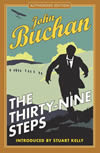 44. The Thirty-Nine Steps by John Buchan (May-June 2023) [Book #178/305]
44. The Thirty-Nine Steps by John Buchan (May-June 2023) [Book #178/305]
The version of The Thirty-Nine Steps that I had purchased was marketed as one of the best mysteries of all time, so I was excited because I love a good mystery. The book was also incredibly short, barely passing 120 pages in the hardcover version I had, making all the more appealing to me. However, the story immediately set me off, being rather antisemitic in several of comments throughout the first chapter. The first chapter was also very difficult to follow with characters written as if they were talking with an accent making it difficult to read and understand. I have trouble enough listening to people's accents and understanding them, I don't need to read them and also not understand them. Although, after the first chapter, the story kicked into high gear and was fairly straightforward to follow along with. Accents were limited and the story was clear cut. I do feel like I missed a chunk of the purpose that was mixed into the first chapter and by the time I got to the end I felt like I missed some parts along the way. The book is set shortly before the outbreak to World War I with a person in an apartment building being murdered, while the guy who's room he escapes to is essentially framed for that murder. Police are involved trying to track him down as well as a shadowy organization. Overall, it was alright and at times very unbelievable. I wouldn't equate it as a "great" mystery by any stretch of the imagination, but it was short and fun and fairly easy to read although I still don't know if I missed parts or they were being purposely obtuse.
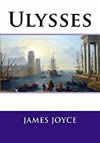 45. Ulysses by James Joyce (March-April 2007) [Book #58/305]
45. Ulysses by James Joyce (March-April 2007) [Book #58/305]
Also on the Norwegian and BBC lists - Although Ulysses is often listed as one of the best books of the 20th Century, I have some definite problems with it. My primary problem with Ulysses is it is written in an odd style, where no two chapters are similar in vocabulary, style, or even concept. Some examples include one chapter written like a play, one with newspaper type headlines, and one that illustrates the evolution of the English language over time. The story itself is based off of the Odyssey set in modern day (early 19th century) Ireland, where the author uses various quirks of language and format style to illustrate several different portions of the story. Had I read this book in a class where they could explain the information to me, I feel like this would have been a much better book, but I didn't. I did have to look up several descriptions of the book chapters online to figure out what was going on and after that the book became much better, but it is still a very difficult book to read. When reading it by yourself some of the sections are completely unintelligible, although the parts I did get I could tell where this book was groundbreaking for its time. After all is said and done though, I'm just not able to recommend this book to anyone anytime soon.
46. Mrs. Dalloway by Virginia Woolf
Also on the Norwegian list -
47. A Passage to India by E. M. Forster
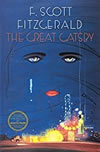 48. The Great Gatsby by F. Scott Fitzgerald (1996?) [Book #4/305]
48. The Great Gatsby by F. Scott Fitzgerald (1996?) [Book #4/305]
Also on the Sybervision, Zane, and BBC lists - Along with a host of other significant stories of the early 1900's, The Great Gatsby finds itself as another mandatory school read. And like many of those books, this is one I need to go back to some day to truly understand the details that I likely missed as a high school student. The book follows the life of a man in the 1920's, who created his fortune (a member of the nouveau riche) while living around people who inherited theirs. These separate worlds clash during the Roaring 20's when people accustomed to "the old ways" must learn to adapt to the new ways that are up and coming. However, Gatsby's excesses may be a bit more than even the most liberal of people could withstand (at the time). A novel about religion, poverty to wealthy, love, and a whole host of other themes interwoven into the fabric of the quintessential 1920's American story.
49. The Trial by Franz Kafka
Also on the Norwegian list -
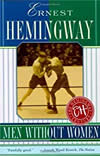 50. Men Without Women by Ernest Hemingway (December 2019) [Book #162/305]
50. Men Without Women by Ernest Hemingway (December 2019) [Book #162/305]
Before coming into this book, I had been a big fan of Hemingway's longer works. This is mainly because they were the first real "literature" I had ever attempted to read on my own, including A Farewell to Arms and For Whom the Bell Tolls. However, I haven't read one of his books in a long time. Men Without Women was the last book of his on any of my lists that I had still left to read and I was confused at first. Apparently, this is a short story collection, and a rather short one at that. I hadn't even realized he had short story collections. In total, the book barely is more than 100 pages long and is comprised of 14 short stories, with two being over 20 pages, making most of the remaining stories 5 to 10 pages long at most. The stories were all written before his longer, more well known works, but most of the stories still seemed to hold the Hemingway style that I had grown to love. His writing style is beyond compare. He is able to draw you into a story very quickly and keep you there with just the beauty of his prose. But since these are some of his earlier works they do feel a bit rougher than his later, more polished works. Within the book, the longer stories are some of the best ones, like "The Undefeated" and "Fifty Grand". His stories clearly are based around situations he knows, like boxing and bull fighting, but I had come to realize something about Hemingway while reading through these stories, as well as reading about the background behind the book. As you can see, the book is titled Men Without Women, and that "without women" part is plainly clear to me now. As I read elsewhere, Hemingway is a great writer, however his focal characters are generally men, and white men at that. Besides white men though, he doesn't do the characters any justice, and in this short story collection, he often just leaves out any, or all, other characters all together. He is also racist and dismissive, and even in one instance it appears homophobic, but the moral of that one story seemed hazy in the end. Overall, I like Hemingway's writing, but I feel these short stories did not age well with the times. I could do without the clearly racist language and undertones, even if they were minor parts of the books, they were still glaring by their inclusion.
51. Journey to the End of the Night by Louis-Ferdinand Celine
Also on the Norwegian list -
52. As I Lay Dying by William Faulkner
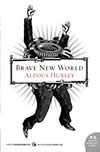 53. Brave New World by Aldous Huxley (August 2019) [Book #157/305]
53. Brave New World by Aldous Huxley (August 2019) [Book #157/305]
Also on the BBC and My Book lists - Brave New World can be pictured as the original dystopian-future novel. Written in 1931, Brave New World envisions a world 600 years in the future where the principles of Henry Ford, of the Model T fame, have been taken to the extreme with human beings being produced on assembly lines and natural birth almost all but eliminated. It is definitely a unique view on the future I had not anticipated. Having seen many dystopian movies and read other dystopian novels this was interesting to go back and look at what the future looked like from a 1930's perspective. The "advanced" technology is exactly as you would envision 1930's "advanced" technology to be, kind of steam-punkish, not the technology of today. And it is less technologically advanced as more biologically advanced. In this future they have perfected making a society were nobody wants more in their station of life, by making sure people manufactured for their particular station. This means that many people are dumbed-down to feel better in more menial tasks and some are allowed to excel beyond these menial tasks. The story shows us how a kid who grew up in the "savage lands", a reservation exempt from this "utopia", would feel in such a land and how this utopia. Although referred to by the derogatory term of "Savage", I believe Huxley's point was to portray him as one of us thrust into this "utopia" of sorts and how we would feel in such a world. I would say my only major gripes with the novel was his depiction of women, who were essentially relegated to being sex-hungry, mindless, pieces of meat added as something for the main character to "deal" with, not as characters in their own right. But other than that the story was intriguing, wholly engrossing, and flowed nicely. I breezed through the novel much quicker than I was ever anticipating. I would definitely place this on my recommend list.
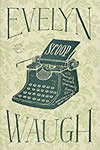 54. Scoop by Evelyn Waugh (July-August 2019) [Book #155/305]
54. Scoop by Evelyn Waugh (July-August 2019) [Book #155/305]
Scoop was not what I was expecting, however I was pleasantly surprised. The story is set up like a 1930's/1940's comedy movie with several people having the same last name getting all shuffled together in different circumstances. The main part of the story dealt with a naturalist/country bumpkin being employed as a war correspondent in the fictional country of Ishmaelia. The country was embroiled in unrest, and had been plagued by an influx of reporters. The story, though was surprisingly funny. I laughed out loud at several points in the story and in general greatly enjoyed it. My only issue with the story was the racism that seemed to be spread throughout the story. It definitely felt like a period piece including the racism of the time, but I had hoped for more. The country of Ishmaelia was located somewhere within northern Africa and felt like a caricature of an African country instead of a legitimate location. Even though I enjoyed the book, it didn't really feel like a "great work of literature". It felt like pulp fiction that one reads and then forgets about. Overall, I would say that the story was enjoyable but forgettable.
55. USA by John Dos Passos
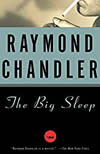 56. The Big Sleep by Raymond Chandler (October 2019) [Book #160/305]
56. The Big Sleep by Raymond Chandler (October 2019) [Book #160/305]
The Big Sleep returns me to the detective noir genra, taking place during the Great Depression with a detective named Philip Marlowe. The feel of the novel was very similar to The Maltese Falcon, however Hammett has something that Chandler lacks. In The Big Sleep I never felt this overwhelming urge to drive on through the novel like I did with The Maltese Falcon. I definitely had the voice-over effect in my head though. Marlowe was narrating the entire story, and that part was enjoyable, with his random quips being generally pretty funny. However, I had a problem with the general premise of the story. This is likely because of my time compared to civilization back then, but it still irked me and I would likely have put the book down never to be picked up again if it weren't for this list. The story begins with Marlowe being asked to find out information on an extortion racket. This later gets expanded upon with multiple murders, fights, and the sneaking around that you would expect from a good detective thriller. However, the overall misogynistic and anti-homosexual context of the story was too much for me to bear. The women in the story were either hyper-sexualized, dumb as rocks, or pointless. The attitude towards the gay characters made them out to be seen as less than dirt who didn't deserve any justice that they may need or want, and it made me angry and sick while reading. So overall, while I could have seen that this novel may have once had a place in history, that is where it now belongs, in the dustbins of history.
57. The Pursuit Of Love by Nancy Mitford
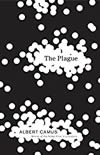 58. The Plague by Albert Camus (May 2022) [Book #170/305]
58. The Plague by Albert Camus (May 2022) [Book #170/305]
Also on the My Book list - Despite this book being added to a 100 greatest books list that was compiled in 2003, it is more perfectly timed for right now than any other book I have read on any of the lists. It feels as if it were made for the "post Covid times" (whether we have reached that yet or not) and fits into the narrative that we all have been living for the last two years. Based on the cholera epidemic of the 1800's, the book takes place in the French Algerian city of Oran during the 1940's (I assume post WWII). The story starts off with first hand accounts of rats dropping dead all over the city and proceeds from there into full lockdowns and hospital clinics being overwhelmed. You can physically match the trajectory of the story to the Covid pandemic (without the rats) and as each phase was entered in the story I was able to place that in our own timeframe. With the narrative set up through the use of first hand accounts and journal articles it also feels phenomenally like World War Z, however the similarities do diverge as this story progresses and the reliance on journal articles and first hand accounts is not as pronounced. The entire story is also guided by an unknown narrator, whom we find out who is at the end of the story. It is an enjoyable story and one I would actually recommend, more so now than probably I would have 3 years ago.
 59. 1984 by George Orwell (February-March 2007) [Book #57/305]
59. 1984 by George Orwell (February-March 2007) [Book #57/305]
Also on the Norwegian, BBC, and My Book lists - Out of the four 100 Greatest Books lists, there are only a few books that appear on more than two lists. 1984 is one out of the few on multiple lists and I can understand why. 1984 is a very powerful novel dealing with possible totalitarian future society and how one might survive in such a society. The only problem I really had with this book was the utter hopelessness of it. Through every page, every paragraph of the book, you had this hope that everything may be ok and that everything turn out right in the world again. Unfortunately, after all is said and done, you knew that it wouldn't. Although this is a fascinating book to read it is very depressing but I must say that it is a definite must read, if only to warn people just might be possible. Because, well, you never know.
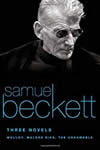 60. Malone Dies by Samuel Beckett (July-August 2008) [Book #77/305]
60. Malone Dies by Samuel Beckett (July-August 2008) [Book #77/305]
The entire Trilogy is also on the Norwegian list - Even though only Malone Dies is on this list, and is the best of the three, I am reviewing the entire trilogy. The trilogy of Molloy, Malone Dies, and The Unnamable at first reminded me of Ulysses, which if anyone has noticed, I despised. But Beckett soon broke away from the incessant ramblings that plagued that novel and gave two really good stories, Molloy and Malone Dies. The novels were written with all the emotion removed and in a rather cryptic way that keeps the reader guessing as you read on. One of the interesting things about Molloy is that as you read through the second half of the story, it begins to feel as if you are getting the prelude to the first half. Malone Dies at first seemed to be completely disjointed from the first novel but reading through it you get the feeling the story may be about the character of Molloy and the book is just a continuation of the first novel. In the third novel, The Unnamable, Beckett returns to the rambling speech that is full of run-on sentences saying nothing. If it was not for the last novel I might recommend this series, but The Unnamable killed it for me. Unfortunately, you need to read all three to get the entire story. So although I somewhat enjoyed parts of it, I can not recommend this as a novel series to be read.
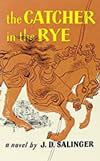 61. Catcher in the Rye by J.D. Salinger (1996ish?) [Book #6/305]
61. Catcher in the Rye by J.D. Salinger (1996ish?) [Book #6/305]
Also on the BBC list - The Catcher in the Rye seems to have been relegated to "cult" status stemming from the obsessive love of the book that Mark David Chapman had for the book. Chapman is well known as being the murderer of the beloved John Lennon. Whether the book deserves this cult status is up for debate but I personally don't understand it. The book is a rather depressing novel about a 16 year-old adolescent, just kicked out of prep school, and learning to deal with the adult world of "phonies." It's a very well written book and really enjoyable to read. However, it has been a long time since I have read the book, so I will place this on my must reread list to hopefully be able to solve this cult classic mystery for myself.
62. Wise Blood by Flannery O'Connor
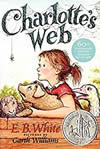 63. Charlotte's Web by E. B. White (August 2010) [Book #93/305]
63. Charlotte's Web by E. B. White (August 2010) [Book #93/305]
This story goes way back for me. I remember growing up and watching the cartoon but I don't believe I ever read the book outright. I read it this time with my daughter and I realized that I would prefer to stick with the cartoon. The sentence structure is often very difficult to read and, I don't know about other books, but reading this out-loud I noticed a ton of "said so and so" after someone said something. This type of writing can get rather tiring after a while and really destroys the flow of a good book. Also, this book reminded me of why I like the Dahl books; it was because of the language. Dahl has a habit of using large words in context, words that you wouldn't usually find in a children's book. In Charlotte's Web, White also uses some large words but it is immediately followed by "I don't know what that means, what does that mean?". That is great for teaching children new words, but I prefer the other method. If you use the word in context well enough, you don't have to explain the meaning. So all in all, it is a touching story, and I did tear up a little at the end, but I wouldn't really recommend this to other people to read.
 64. The Lord Of The Rings by J. R. R. Tolkien (January - February 2005) [Book #35/305]
64. The Lord Of The Rings by J. R. R. Tolkien (January - February 2005) [Book #35/305]
Also on the Observer and My Book lists - Following The Hobbit, I dove headfirst into the tome that was The Lord of the Rings. Although it is often listed as a trilogy of books, my book list treats it as a singular novel, and really that was what it was meant to be. Looking at the detail that Tolkien puts into this world, it is absolutely incredible. For a book that took ten years to write, you can tell. The story is so in depth and the languages that were created so complete that you can almost feel like this is an actual world. Word of advice, I recommend that you read it like I did. Read The Hobbit first, then expand into this book because The Hobbit flows into this book. Also, watching the movies after reading these books gave me so much more insight that upon first viewing I missed. The characterization in these novels is some of the best I have ever read. I love stories that tie back into a whole wider universe. This novel alone had urged me on to explore all of the Tolkien stories tied together, from The Silmarillion to the Lost Stories. If you don't like fantasy novels this might not be for you, but it is dead center of my alley. Overall, the book is fantastic, you just need to read it to appreciate it. Definitely on my must read list.
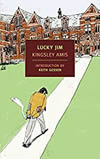 65. Lucky Jim by Kingsley Amis (October 2022) [Book #174/305]
65. Lucky Jim by Kingsley Amis (October 2022) [Book #174/305]
Jim Dixon is a first year college professor who seems to be on the verge of losing his job and keeps blundering at any attempts to make things better. On the surface this would seem like an ideal book for me as a former college professor who did also only teach for one year (through no fault of my own though, as I was only hired as a one year temporary fill-in). The book is surprisingly funny and often subtle about it's humor. The characters are all extremely well written and you very quickly get the sense of what each character is and how you should feel about them. And even though the book is slightly male-orientated and misogynistic, it's actually far better than many contemporary works that are hailed far more than this book is. So, overall, I enjoyed reading this. I do however have a problem with it being considered one of the "100 Greatest Books of all time". It's not. I mean it is a good book, and an enjoyable read, but I would classify it as "fine". There is nothing overly special about the book and nothing to write home about. I would recommend it as a quick, humorous, look at the life of a first-year college professor, but other than that it's really just a burner book, read it and move on.
 66.Lord of the Flies by William Golding (March 2025) [Book #187/305]
66.Lord of the Flies by William Golding (March 2025) [Book #187/305]
Also on the BBC and My Book lists - This is one of those books I would classify as your standard middle school novel, that I however was never tasked to read. Even though I had never read this before, this is one of those stories that has permeated society to the point that many (most?) people could give you a generalized overview of the story. The story follows a group of boys who are stranded on a deserted island and how their "society" degrades from there. What I was not expecting, but makes sense, is that this is a dystopian novel about essentially the aftereffects of a nuclear war. Comments had been made almost in passing throughout the novel, but it was interesting how the reader is bounced around between some hopeful characters interacting with those who "know" more about what has been going on in the world. On top of all that is just the general fall of society into barbarism with certain members of society fighting back against it with rules and those members losing over time to the more aggressive, violent members of society. I found the debates between the different members of society to be the most interesting, since these are life and death debates in their world and yet also brought down to a child's level. Absolutely wonderfully written. It is so easy to fly through the story (it being extraordinarily short helps), and it is gripping. I flew through the whole thing in less than a week and read half of it in about a day. It was also much darker and gruesome than I was anticipating for a story where children are the focus. There is some notable geological problems with the story, which also gets me giddy all over. However, overall, this book was a lot of fun and one that I would highly recommend.
67. The Quiet American by Graham Greene
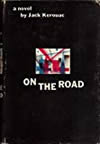 68. On the Road by Jack Kerouac (April 2022) [Book #169/305]
68. On the Road by Jack Kerouac (April 2022) [Book #169/305]
Also on the BBC list - As one of the seminal books of the Beat Generation, On the Road gets a sort of larger than life impression every time that I hear about it. Before I started the book I had thought it was a sort of autobiography/life lessons tale and that is sort of how it turned up after I read it. The book is essentially an autobiography, except with the names changed and, as far as I am aware, some of the circumstances adjusted for the narrative. The book essentially follows Sal Paradise in the first person role (standing in for Kerouac himself), along with the other prominent figure in the book, Dean Moriarty, standing in for his real life friend Neal Cassady. The narrative is broken up into 5 parts, each of which encompasses a unique cross country trip where Sal "just has to get away". Often times the trips are hitchhiking, bus travel, or driving a car into the dirt, and all of them are with Dean along with an assortment of other characters that come and go throughout the narrative. Taking place in the mid 1940's, post war, we are getting a different picture of America than we have today. Yes, things are cheaper, such as gas, but people are making much less and we see into the lives of those on the lower end of the socioeconomic spectrum. We live with them through the book and talk to them and really get a sense about who they are and what matters to them. That along with the prose, which is absolutely riveting, really draws you into the story. The style of the book is written based on a rambling, run-on letter that Kerouac once received from Cassady with the sentences sometimes going on and on, and other times being cut rather short. Ideas, themes, and questions are often brought up in the story and then immediately dropped, never to be answered or even acknowledged again. Kerouac's descriptions though, and his often poetic prose, makes this a beauty to read with bits and pieces of contemplative fiction and philosophy creeping in that is often profound in its take.
With all that being said, there is a major negative to the book. And that is that it's content is often homophobic, racist, misogynistic, pedophiliac, and probably lots of other negative adjectives that I can't think of at the moment. It's like these characters dive into these worlds of sex and drugs and are still able to pick out the negative stereotypes about everything. But it is weird, in that they "love" those stereotypes so it is a kind of "romanticized racism". With all of the gay characters in the book it is also super weird at how homophobic the book really is, however reading outside the book, I found out that Kerouac was rather a homophobe himself despite having almost all of his friends it seems in the LGTBQIA community. And although the book is often romanticized about it's "get out and see life" message, I see it as a tragedy, with the character of Dean slowly destroying his life through one method or another, and a character that could seriously have used medical and therapy intervention that could have perhaps helped with his constant downward spiral throughout the book. He gets to the point where he is often characterized as not being able to speak or make a sensical thought by the end of the book. If anything I see this book as a warning, and not necessarily a romantic adventure book. Overall, I would say that despite the beautiful prose, and the fantastic look at America in that time period, it is hard to recommend given all of the negatives throughout the plot and I would have to say unless you are really interested in reading it you could likely skip is and be fine.
 69. Lolita by Vladimir Nabokov (January - February 2011) [Book #98/305]
69. Lolita by Vladimir Nabokov (January - February 2011) [Book #98/305]
Also on the Norwegian and the Zane lists - This was a rather odd book for me. At first I thought the book would never, ever, make it on to my Must Read List because of the semi-pornographic nature of the book. But it was worse than that, it made me feel awkward because it is all about a man who has a sexual interest in pre-pubescent girls (around the age of 12-14). So all the while I am reading this, I feel like I am going to get in trouble for child pornography. By once you get past the initial portion of the book things got really interesting. The second half of the book I found to be by far the better half. It focused more on the mental anguish of the main character as he pursues his Lolita, both knowing that he has and will destroy her life, but also not being able to control himself. It is a perfect view into self-destructive behavior. The main plot point of the story is similar to another book I had read, An American Tragedy, which focused on a person in jail and you basically found out how he ended up there. But there is a difference in Lolita, where the story is a first person narrative of basically how he ended up in jail. And throughout the story you assume how he ended there but as you progress you realize you were wrong and it really is for something different. The story was rather riveting in this aspect and I did enjoy the second half of the story immensely. So, all in all, I can't recommend this story due to the awkward feeling first half (which I imagine is almost impossible to get through for some people) but I did enjoy it and would recommend it for those who could get past that point.
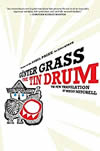 70.The Tin Drum by Günter Grass (February-March 2020) [Book #163/305]
70.The Tin Drum by Günter Grass (February-March 2020) [Book #163/305]
Also on the Norwegian list - Upon initially starting The Tin Drum, I had a couple of friends tell me that they really enjoyed the book, so I was looking forward to it. However, the first third of the book was very difficult for me to get into. It could have been the translation, having initially been written in German, but the text didn't really give me much problems. Especially towards the latter 2/3rds of the book. It was the context of the book that I had issues with. The book is essentially a slight supernatural/fantasy book following along a man named Oscar and his family as they grow up through World War 2 in Poland and Germany, although, the war barely plays a backdrop to the book. The story is really about Oscar and his unique abilities, of which there are a few notable ones. The main ability of his that is the namesake of the book was his relentless drumming from the age of 3 onward. The presence or absence of the drum played a pivotal role throughout the story and was essentially how Oscar was able to communicate with other people at times. Although, the most notable is that Oscar decided to stop growing (for the majority of the book) when he was three years old. He wasn't really a "little person" per se, because he never looked any older than a three year old. And although he was a self described genius, he often would act like a three year old at random times throughout the book. After a while this made Oscar not become the "hero" of the story, but a rather self-centered jackass, with less than noble morals. This all made him a not terribly likable character, performing various murders and rapes throughout the book. The prose of the novel was beautifully written but it did not allow for a smooth reading experience, forcing me as the reader, to take my time and read through it carefully. This resulted in being able to only read the book for short snippets of time, because otherwise I would get tired of trying to keep up with it. I actually think this book would be much better as an audiobook, reducing the mental concentration required. Overall, I would say that the story became entertaining, but was frequently frustrating, and I don't think I can recommend this but some people would probably enjoy it.
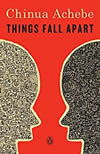 71. Things Fall Apart by Chinua Achebe (April 2018) [Book #147/305]
71. Things Fall Apart by Chinua Achebe (April 2018) [Book #147/305]
Also on the Norwegian and My Book list - Before ever reading this book, I was enamored by the title. Things Fall Apart is a truly fantastic title because it encompasses a whole lot of information with only three words. The story is also incredibly short, taking me less than a week to read with my version (the Everyman's Library hardcover) only having 180 pages. For the book itself I am terribly conflicted on how I feel. The first half of the book deals with the main character, Okonkwo, who lives within a tribal village in Africa. This story is his story, and we get to see life primarily from his point of view. My first problem though, is that he is a horribly unlikable character, however this could easily be a cultural thing. Within the story we witness Okonkwo's life from his perspective, where he routinely beats his wife and children and usually it is no big deal. There are times where he does get in trouble for it, but mostly because he does it during a sacred time, not that he actually did it. He also murders a kid early in the story, where it is implied he will see retribution in some form, but it never happens. Looking at Okonkwo's culture in general, it is presented as horribly machismo. If you're not a "man" then essentially you are weak and not worth the ground you will be buried in. I would visualize it as toxic masculinity at its worst, at least from Okonkwo's perspective. However, as you read more and more into the story the reader really gets into their society. It makes sense. And a lot of the things that happen, you as the reader, can go along with and understand. The first half sets up Okonkwo's life and culture and then something happens, which I'm still not terribly sure how it happened, but Okonkwo is exiled for seven years for manslaughter (essentially). And it is at this time that things start to "fall apart". And here is where it really starts to get interesting. I was under the impression while reading the first half, that this story would focus entirely on this African tribe but shortly into the second half of the story we are introduced to the 'white man', whom not many, if any, of the tribe have ever seen before. The white man ends up bringing his church with him and slowly lures people away from their culture, to the point that local tribesmen are doing things that are horrific to their former beliefs.
And this is where I am conflicted. On the one hand, I don't like the main character as a person. But on the other hand the church here is much worse. They basically condemn these people to death in many instances because the church obviously knows better. Not all of the church people are bad, but the good one in the story goes away and much worse people take his place. The reader can easily see that it is the church that basically dismantles this tribe's culture and society. You feel for these people and when 'everything falls apart', it's heartbreaking. The writing style of this book is actually fantastic. It is incredibly easy to read, which is remarkable since it was written in English, the author's second language. It does take a little while to get used to the names of the people, since many of them are written in similar styles, so piecing them apart to discern who is who takes some time. But I caught on fairly quickly. It's similar to Russian writing in this way. Overall, should you read this? A definite yes (I think). It's not a feel good story by any means, but it is an important one. It is a story about the death of a rich African culture, where the reader truly feels that culture, and watches it slip away from them. Where some of the people stand up to fight this change, and they are the ones who are quickly put down, leaving only this new system behind. Heartbreaking to say the least, but important to understand.
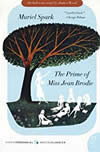 72. The Prime of Miss Jean Brodie by Muriel Spark (June 2019) [Book #152/305]
72. The Prime of Miss Jean Brodie by Muriel Spark (June 2019) [Book #152/305]
I went into The Prime of Miss Jean Brodie knowing absolutely nothing about the book or the author. All I knew was that it was fairly short at 125 pages. So I dived headfirst over a camping trip and was able to finish it over the weekend. The book takes place during the Great Depression at a women's school where one of the teachers, a Miss Jean Brodie, has a rather unique method of education. She likes to tell stories about her past and use them to influence a select set of girls within her class of middle school age girls. Miss Brodie keeps telling the girls that she is in the "prime" of her life (hence the title) and that she is fully able to mold the girls into proper adults. The story is interestingly laid out, with the narration of the story bouncing around each of the "Brodie set" (the girls she is influencing), both in the story "present" as well as in their future, long after school is over. But the narration also dances around the girls heads, like if they are having daydreams, it flows with part of the story. It's a story that I could get behind ... in theory. However there were several factors of the story that irked me. The author repeated herself on many points, many, many times. She would say the same thing about the girls repeatedly. And while I can see that as a useful tool so that the reader could distinguish between the girls, it got old very quickly. The story is not that long that you need to repeat the same part 5, 6, or 7 times. Also the main girl, Sandy, I rather hated. I feel like she was written so the reader didn't like her, but it makes for a tiresome book when you don't like the main character at all. The molding of the girls was rather interesting, though. I liked how the story evolved in that sense, how the girls changed throughout the story due to Miss Brodie's influence, and how that influence could be seen as a helpful or harmful thing. While reading the story it also felt like the part about it being set in the 1930's was not at all relevant to the plot, but it winds up being a major factor in the end of the story. An interesting story indeed. So overall, I'd say that this book was good in concept but left me with a bad taste in my mouth in execution.
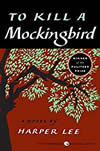 73. To Kill a Mockingbird by Harper Lee (October - November 2015) [Book #132/305]
73. To Kill a Mockingbird by Harper Lee (October - November 2015) [Book #132/305]
Also on the Sybervision, BBC, and My Book lists - Typically, when I am reading one of the books on this list, I am usually thinking of what I am going to say as a review, at least during the last quarter of the book. However, for To Kill a Mockingbird, I had to wait a couple of days until after I finished the book. I had burned through it so quickly, and I'm still having a hard time putting together by thoughts. The book follows the life of a young girl, Scout Finch, living during the depression in a small town in Alabama. As is true with most children, she is inquisitive and playful and the book follows her through her games and exploration of the world around her. She has a mysterious neighbor, who the children are bent on tormenting, even though they have never seen him. An interesting story point that does come to fruition by the end of the story. The main point of the book however is regarded as background material throughout the first portion of the book. This story element, like many in the book, slowly reveals itself through the natural course of storytelling. Scout's father, Atticus, is a lawyer and is charged with defending an African American man accused of raping another man's daughter. How the story manifests itself through the eyes of Scout is truly remarkable. Several times throughout the book I felt myself well up at the sheer impact of the story. I'm not sure if it is because I am father of a young girl and I can place myself in Atticus's shoes at times, or not. But this is truly an emotional novel about race relations during the Great Depression, and how far we had to go at the time. The writing couldn't have been easier to follow, and the descriptions were truly outstanding. Harper Lee's descriptions would often flow through the story, not being placed at any particular point, but would appear as natural eddies in the narrative.This resulted in me flying through the novel, reading half of it in one day. This novel has easily ascended to become one of my favorite books of all time, well within my Top 5 favorites.
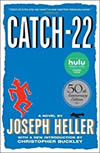 74. Catch-22 by Joseph Heller (July-October 2022) [Book #173/305]
74. Catch-22 by Joseph Heller (July-October 2022) [Book #173/305]
Also on the BBC list - The phrase "Catch-22" has become transcendent from the original novel from which it was sparked but I never fully understood what a "Catch-22" was or how exactly it originated. I knew that it was something that was impossible because of conflicting events. You couldn't do A unless you did B first, but you couldn't do B unless you did A first. So it ends up being something impossible. However, I have now learned what it means in respect to the novel. Catch-22 is a war novel set during the latter days of World War II. In here a "Catch-22" is something that happens in response to a soldier trying to get discharged from the army because they was felt they were mentally unfit, or in essence "crazy". All one had to do was go to the doctor and tell them you were crazy to get discharged. However, if you were able to tell the doctor that you were crazy, then you had to be sane enough to know that, and so you were not in fact crazy and therefore couldn't be discharged. The story of the novel itself plays out much like a M*A*S*H or an F Troop (if anyone still remembers those shows) which are all satirical military stories. Throughout the novel there constantly are incidents and conversations that are downright laugh out loud funny. But as the novel proceeds, you can tell that the tone shifts from humorous to more serious as many of the main characters start to die or be killed off. It is an interesting take on the genre and one that I was fully invested in. At least, at first. As I proceeded through the novel I noticed that the vast majority of the characters were all male, most of whom were white, which would make sense for the time period and setting it was set in. However, all of the women in the story were either prostitutes or treated as such. All of them barely had any dialogue, if any at all, and most of them were treated in the worst ways possible. Sexual assault was treated as a joke while rape and murder were blown off by the local police because the woman didn't matter. The blatant misogyny was a bit overwhelming, but not only that but the complete disregard for women at all in the novel. They were set pieces to be used or abused as needed and then discarded when their time was over. And so while I can understand why this could be considered a great novel of its time, it has not weathered the test of time very well and I can't recommend that people wade into it unless they really want to.
75. Herzog by Saul Bellow
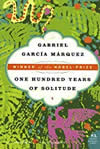 76. One Hundred Years of Solitude by Gabriel Garcia Marquez (June-July 2019) [Book #153/305]
76. One Hundred Years of Solitude by Gabriel Garcia Marquez (June-July 2019) [Book #153/305]
Also on the Norwegian, BBC, and My Book lists - I found myself constantly comparing One Hundred Years of Solitude to Marquez's other work on the list that I read almost 12 years ago, Love in the Time of Cholera. You can definitely get a feeling for Marquez's style between the two books. I have to say though, that between the two, Love in the Time of Cholera was a much easier book to get in to, but One Hundred Years of Solitude was the more impactful. To sum it up One Hundred Years of Solitude was fascinating, horrifying, hilarious, depressing, intriguing, and by the end, I couldn't put it down. The story is about a fictional South American town named Macondo that was founded by the couple José Arcadio Buendía and Úrsula Buendía. Within the story we follow the development of the Buendía family, and despite how large or small the town gets, eventually turning into a thriving metropolis, we never really feel that because of the focus on this family. However, the family mirrors the effects of the town; as the town grows, so does the family, as the town shrinks, so does the family. One of the first things we learn about the family though is that there are issues with the family, specifically incest, which comes up again and again, which is one of those things that is rather horrifying in the story. The story, though, is about cycles, and how everything changes, yet everything stays the same.
One of the hardest parts of the story to get through was the names of the characters. The story was written where time kind of bounced all over. Even the first sentence of the book begins with an illusion to what would happen halfway through the narrative. But the names of the characters were all either identical or very, very similar, making keeping track of who was who extremely difficult at times. By the end I still couldn't remember who was who's daughter/grandmother/aunt. But it works in the context of the story. The Buendía family is constantly making the same mistakes, constantly rehashing the same issues, through several generations, and by renaming their kids after either the patriarch José Arcadio or Aureliano (I believe there was at least 22 Aurelianos mentioned by the end of the story), it got to be rather confusing. This was not an easy book to read because of that. I could only read about 20 pages a night because I kept having to go back and rereading to figure out who was who as time slowly marched on through the story, bouncing back and forth as it went. The chapter breaks generally covered a different person within the generations as they progressed through life as well. So by the time I got to the end of the story, I immediately wanted to jump back to the beginning to see how it all tied together. This is a definite reread story, to catch all the hints about later parts of the story in the earlier sections. It is a story about time, where time doesn't seem to be happening. It is a fascinating tale and a definite one on my must read list, but it is work to get through, if you want to get everything out of it.
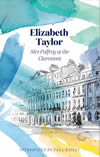 77. Mrs Palfrey at the Claremont by Elizabeth Taylor (February - March 2024) [Book #179/305]
77. Mrs Palfrey at the Claremont by Elizabeth Taylor (February - March 2024) [Book #179/305]
Also on My Book list - In general, Mrs Palfrey at the Claremont took me by surprise. It is a fairly short book, with the version I read being just under 200 pages, which is what prompted me to read this book on my list; a quick break while I read through a much longer book. The premise of the story is about an older woman, Mrs. Palfrey, who was looking for a place to live while she was no longer able to, or no longer wanted to, live on her own but had not yet reached the stage of needing a nursing home. The Claremont then became her home, a hotel with a bunch of long time residence, mostly all older in age. One day, while she was walking home, she slips outside a young man's apartment, Ludo, who helped her up and eventually became the replacement for her negligent grandson. And this gets to the core of the story. Mrs. Palfrey is living a lonely existence. Her daughter and grandson have essentially abandoned her and she has no one. And while loneliness may seem at the heart of the story, it was also a rather funny story. Making this a seriously hard book to peg down. I had laughed out loud during several instances of the story. The core of the story is about how older people just kind of get ignored in our society (even back in the 1920's when this takes place) and left to their own devices, forgotten and ignored. But they aren't the only ones. Ludo was also dealing with his own loneliness. As well as all of the characters. They all had their own "things" they were dealing with, leaving everyone to feel all by themselves. As the story wrapped up, it ended with a profound sense of loss and sadness in a situation that I don't wish on anyone but I know countless people go through everyday. The book was excellently written and a joy to go through, with each heart breaking moment counterbalanced with a laugh. I have to recommend this book because it was so, so good. But in the end, it definitely was not an uplifting story at all, but an accurate one about life. Also note that Mrs Palfrey at the Claremont is not written by the actor Elizabeth Taylor, but the author Elizabeth Taylor, who are two distinctly different people (as far as I can tell).
78. Tinker Tailor Soldier Spy by John Le Carre
 79. Song of Solomon by Toni Morrison (December 2007 - January 2008) [Book #70/305]
79. Song of Solomon by Toni Morrison (December 2007 - January 2008) [Book #70/305]
Also on My Book list - I rather enjoyed Song of Solomon, however I am not sure if it should go on my personal must read list. It is rather vulgar through most of the story but it tells a very good tale. The story is partly about a black man living in an intolerant society. I read comments elsewhere that this is a work about living as a black person during the early 20th century, but I do not feel that is the primary story being told. The deeper story is about a man learning about his roots (his people) and learning that family is more important than anything else. The flow of the story carries it along at a great pace and you never know what might happen next, but it all works in the end. Alright, I will put this on my list but with a warning: the story has very harsh language, however it is used with a purpose and fits into the story very well.
80. The Bottle Factory Outing by Beryl Bainbridge
81. The Executioner's Song by Norman Mailer
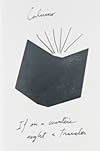 82. If on a winter's night a traveler by Italo Calvino (May 2020) [Book #164/305]
82. If on a winter's night a traveler by Italo Calvino (May 2020) [Book #164/305]
If on a winter's night a traveler has to be one of the most unique books I have ever read, especially on this list. When thinking about how to categorize the book, I found it very difficult to place it within any category, however if push came to shove I would say that this is a mystery. The mystery for the story is that the main character, often just called the Reader, is trying to find the conclusion of story that he started reading but was missing from the book. During the process he discovers another Reader, whom he teams up with and they end up trying to hunt down the missing text together, only to come across a whole host of uncompleted books. The weird part about the story, is that at times the book is written as if it were talking to us, the audience. But at other times the author treats the book as a book, with the characters acting as one would normally act within a book. It's weird. Chapter one of the book started off so unexpectedly that I had to check a few times to make sure I wasn't reading an introduction:
"You are about to begin reading Italo Calvino's new novel, If on a winter's night a traveler. Relax. Concentrate. Dispel every other thought. Let the world around you fade...."
But after some flipping around the book I soon discovered that, yes, this is indeed how the book is going to go. I thought it was going to be a rather meta reading into the book, when it ends up shifting topics part of the way through, and eventually morphs into that mystery I mentioned. Although it does play with the meta part quite frequently, delving into what you are reading and treating the story as if that is what the Reader is discovering about the book he is hunting for. It feels almost as if this book were written for authors, and that authors would be the ones to get the greatest enjoyment out of it. But otherwise the text was extremely easy to read, at least in the translation I was using. I found I was able to read this book for longer periods of time and at a much faster pace than I am with many of the books on this list. The book was also fairly short, only about 250 pages. So, all in all, a definite recommend, especially for the unconventional nature of the story.
83. A Bend in the River by V. S. Naipaul
84. Waiting for the Barbarians by J.M. Coetzee
85. Housekeeping by Marilynne Robinson
86. Lanark by Alasdair Gray
87. The New York Trilogy by Paul Auster
 88. The BFG by Roald Dahl (November 2008) [Book #79/305]
88. The BFG by Roald Dahl (November 2008) [Book #79/305]
Also on the BBC list - The BFG is a children's book about a little girl who discovers a Big Friendly Giant (AKA the BFG). Along with the BFG, there are other giants who are not so friendly, well, because they eat people. The plot of the story is that the little girl convinces the BFG to take the bad giants down. I found this to be a rather gruesome story for a child but ended up being a perfect children's book. My main gripe, and this is a general gripe with Dahl, was that the made-up words got to be a bit tiresome after a while. The story has clear cut morality issues and includes a heroine who is just your everyday kid. It is a good story for kids that parents do not need to be too worried about, despite the gruesomeness. Overall, the book was enjoyable, but it was just not my cup of tea.
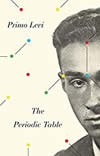 89. The Periodic Table by Primo Levi (September, 2019) [Book #158/305]
89. The Periodic Table by Primo Levi (September, 2019) [Book #158/305]
Also on My Book list - Starting out this book was an enigma for me. I initially assumed it had something to do with the formation of the Periodic Table. Then upon reading a general book description I was immediately expecting an autobiographical account of a Holocaust survivor similar to Elie Wiesel's Night. This was nothing of the sort. I think Levi best sums up the book in his own words towards the end of the book:
"...I was in search of events, mine and those of others ... to see if I could convey to the layman the strong and bitter flavor of our trade (as chemists).... I was more interested in the stories of the solitary chemistry, unarmed and on foot ... who confronted matter without aids, with their brains and hands, reason and imagination."
That is in essence what the book was about. It was a series of stories, some of them assumed to be autobiographical, and some of them clearly not, all within a framing story of a different element. Each chapter was laid out with the title of that element and the story that followed had something to do with it. Levi was a Holocaust survivor, however his trials during his time in the camps were largely left out of the book. He mentions them as being memoir-ed in other works of his so they were skipped over here. It was like a series of bedtime stories, with a thread that worked it's way through the whole book. More often than not, I hate short stories. But this book didn't work in that way. It worked as a narrative. His various other stories, outside of his autobiography, added heart and soul and a realness to the book by sometimes being a bit fantastical in themselves. The book was surprisingly funny and upbeat, despite the dire circumstances at times, but it was also moving and sentimental. You don't find out much about Levi's personal life, except in relation to the elemental story he is telling at the particular moment. The best part of the book had to be the Chromium chapter, which was surprising and hilarious, and a pretty much self contained story within the greater narrative. Overall, I would say this was a fantastic, engrossing read. The only weak part was the first chapter which felt like a drudge to get through with all of Levi's relatives ever listed out, who never reappeared in the story at all. But once you get past that part the rest was smooth sailing.
90. Money by Martin Amis
91. An Artist of the Floating World by Kazuo Ishiguro
92. Oscar And Lucinda by Peter Carey
93. The Book of Laughter and Forgetting by Milan Kundera
94. Haroun and the Sea of Stories by Salman Rushdie
95. LA Confidential by James Ellroy
 96. Wise Children by Angela Carter (October 2024) [Book #182/305]
96. Wise Children by Angela Carter (October 2024) [Book #182/305]
I went into this book expecting a nice short read and got something I definitely wasn't expecting. The story follows the interpersonal familial relationships of Dora Chance, twin sister to Nora and child of another set of twins, Melchior and Peregrine Hazard. The question of which twin they are the children of is up for discussion during the text and becomes one of the major plot points. But that is not all, the story generally follows the lives of Nora and Dora through Dora's recollections as she thinks back on her life. While we are traveling through her life we also get hoards of other family jumping in and out of the story. To the point that I was very lost as to who was who and how everyone was related. I did find a family tree online after the fact, and there was a dramatis persona at the end of the book (because everything in it is a huge spoiler for the book), and while the dramatis persona helped, the family tree would have helped me much much more. The story though bounces around quite a bit, making it difficult to follow who is who and what their relationship is in everything. Add into all of that that the author doesn't always spell out who is who, or waits to do it. So sometimes the reader is just left wondering if they missed something. For instance, a main character is just identified as "Wheelchair" for a good chunk of the book but takes forever to tell us who she actually is. I noticed online that this book is noted for it's open feminism and support of the women's liberation movement and that is a definite plus in my eye, however this book definitely has one major flaw that is insurmountable for me to get past. And that is the raging incest throughout the book. While some interfamilial relations were frowned upon in the book (rightfully so), others such as cousins and niece-uncle were not only not frowned upon but celebrated in the end. It became overly much. There was also comments about slaughtering a pet pig and eating it after the owner died that pushed me over the edge. And so while I feel it has some strengths to it, I can't recommend it for many reasons.
97. Atonement by Ian McEwan
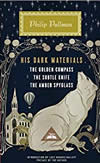 98. Northern Lights (AKA The Golden Compass - Book 1 in His Dark Materials) by Philip Pullman (June - July 2006) [Book #48/305]
98. Northern Lights (AKA The Golden Compass - Book 1 in His Dark Materials) by Philip Pullman (June - July 2006) [Book #48/305]
The entire trilogy is also on the BBC and My Book lists - This the review for the entire trilogy where this is the first book (under the UK title). His Dark Materials has quickly become one of my favorite stories of all time. The series is absolutely enthralling, not letting me put it down for a moment. And it is one of the few series I have returned to time and time again. The story can be considered a cross between The Chronicles of Narnia and The Lord of the Rings, where the world building is a bit less in-depth than LotR and much less preachy than Narnia. I find it a cross between the two stories that takes the best of both worlds. The story is about parallel universes, where the primary character, Lira, is a kid with a physical manifestation of her soul literally on her sleeve; or running all around as the case may be. Lira starts out being a very young kid with little worldly experience, who, over the course of the story, grows into the hero the story needs. I have often heard criticism that this series is like the "atheist's bible" or some nonsense like that, and I find that surprising as this book is actually very spiritual. It is very anti-organized religion though and that could be a bit off-putting to some. I found the story to be a well-written and fast-paced read (about 1000 pages in 2 weeks), where in the end all the plot lines got wrapped up neatly. Although, I do disagree with how it ended, but looking back on the story there was really no other way it could have gone. This is obviously a must read for me and one I have often recommended to a lot of people.
99. American Pastoral by Philip Roth
100. Austerlitz by W. G. Sebald
